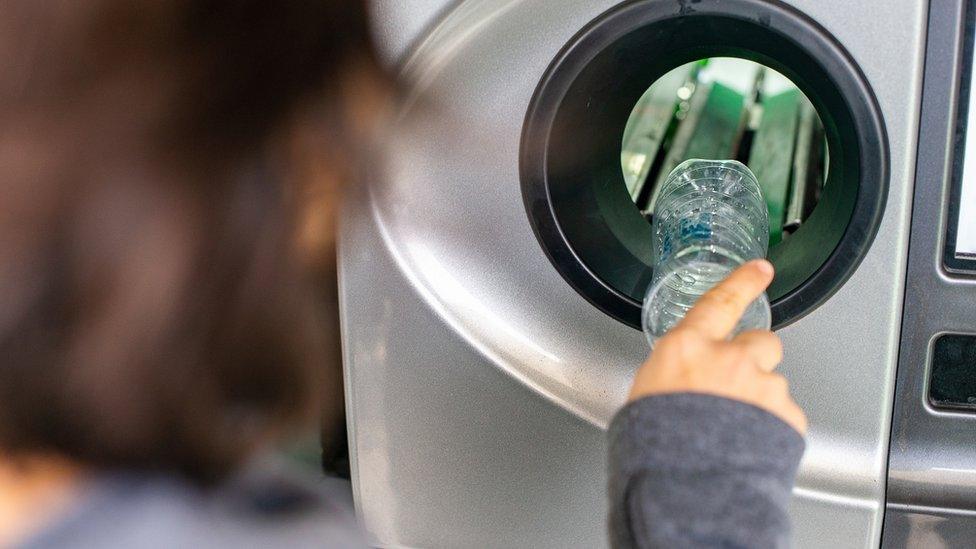Lorna Slater announces overhaul of bottle return scheme
- Published
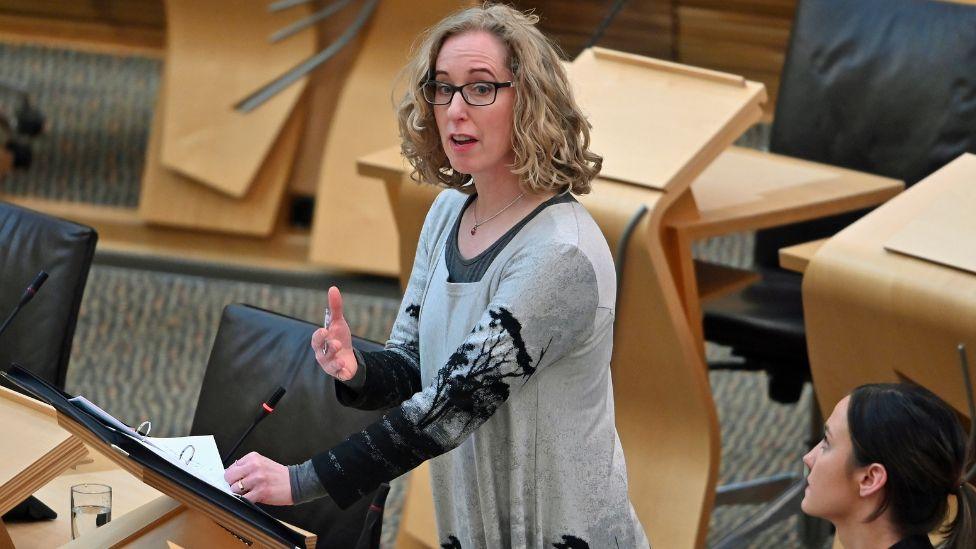
Circular Economy Minister Lorna Slater has announced new support measures for businesses
The minister charged with introducing Scotland's deposit return scheme (DRS) has announced an overhaul to its rules after it was delayed until 2024.
Circular Economy Minister Lorna Slater told MSPs that small containers and products with low sales would be exempt from the initiative.
She said the delay until 1 March was "unavoidable" due to a lack of engagement from Westminster.
Tory ministers have called for a UK-wide approach to the recycling scheme.
In a statement to parliament, Ms Slater explained the delay, set out measures to help businesses adapt to the initiative, and announced further exemptions from the scheme - including a move to exclude many small producers.
She said all drinks containers under 100ml will be excluded from the recycling programme - effectively removing all miniature bottles of alcohol - as well as products of which fewer than 5,000 units a year are sold.
The minister told MSPs the latter change will remove about 0.5% of articles from the scheme, but will eliminate about 44% of businesses from having to apply a deposit of 20p to products.
Hospitality premises which sell the "large majority" of drinks products for consumption on site would also be exempt - in a move targeting firms that sell some takeaway products.
Ms Slater said the online process to apply for exemptions had been simplified and that the producer agreement with Circularity Scotland has been shortened to address concerns about its "size and complexity".
The changes are yet to be approved by parliament.

'Not a silver bullet'
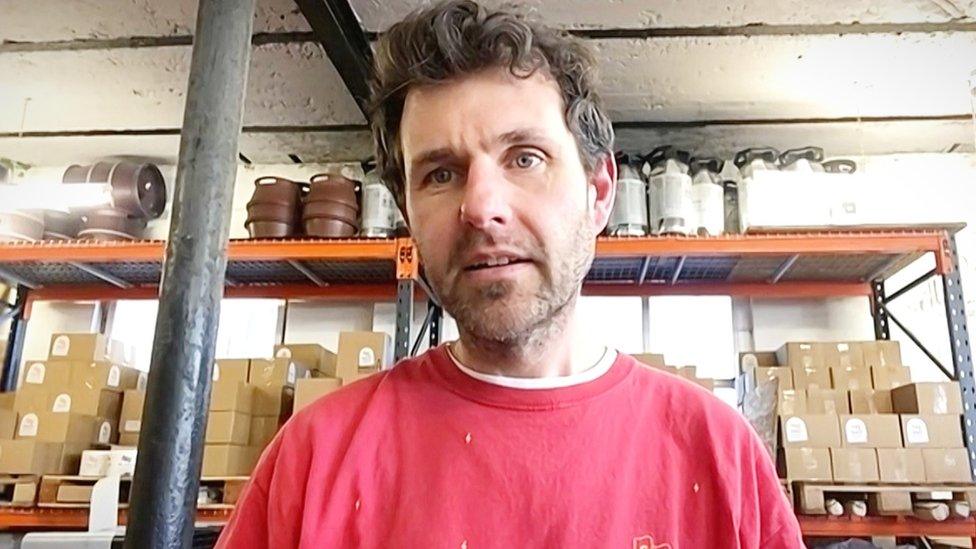
Phil Sisson is the owner of craft brewery Simple Things Fermentations
The government has said the exemption for products which sell fewer than 5,000 units per year would "particularly benefit craft producers".
But Phil Sisson, the founder of Glasgow craft brewery Simple Things Fermentations, said Ms Slater's announcement was "far from a silver bullet".
"My hope was to hear that we're just going to hold off and do it all at the same time as the rest of the UK because that would just make everything so much simpler," he told BBC Scotland.
Mr Sisson warned the DRS could potentially double the administration costs for his firm, which sells about two-thirds of its products in Scotland and a third in England.
"We're busy trying to say alive in the times that we're in anyway and the more time we're messing about doing two different types of invoicing and all the rest of it the less we're able to get on and make and deliver beer," he said.
The brewer also said that although most of his products would be covered by the 5,000-unit exemption, it did not give incentive for growth.

MSPs were told the DRS could not go ahead as planned in August without an exemption from the Internal Market Act, which is required due to its implications elsewhere in the UK.
"With just four months to go that exclusion has not been issued, making a delay to the scheme unavoidable," Ms Slater said.
"Readiness for August was always going to be challenging, particularly given the difficult conditions that industry has faced in recent years. But the chilling effect as a result of Westminster's position has made it impossible."
Ms Slater said the "primary cause" for the delay to the scheme was the "uncertainty" caused by the UK government as she accused Mr Jack of briefing against the scheme.
'Undermining confidence'
Ms Slater told parliament: "The effect has been corrosive, undermining confidence, stalling progress and halting private investment.
"Some businesses have said they will simply not join the scheme because of the UK government's position."
The minister said she was "confident" the UK government would grant an exemption. She told parliament that she would again request an urgent response from the UK government after her statement.
In response to the delay, Mr Jack said the two governments now had "an opportunity to continue working together on solutions".
A UK Government spokesperson said ministers received a formal request for an exemption 6 March.
They added: "The Scottish government has since been reviewing and has now paused the scheme, so it has not been possible for us to fully assess the impacts of the exclusion request on cross-UK trade, businesses and consumers.
"We will continue to engage with the Scottish government to understand the outcomes of their review and will work together to realise our shared ambition to improve the environment while meeting the needs of consumers and businesses across the UK."
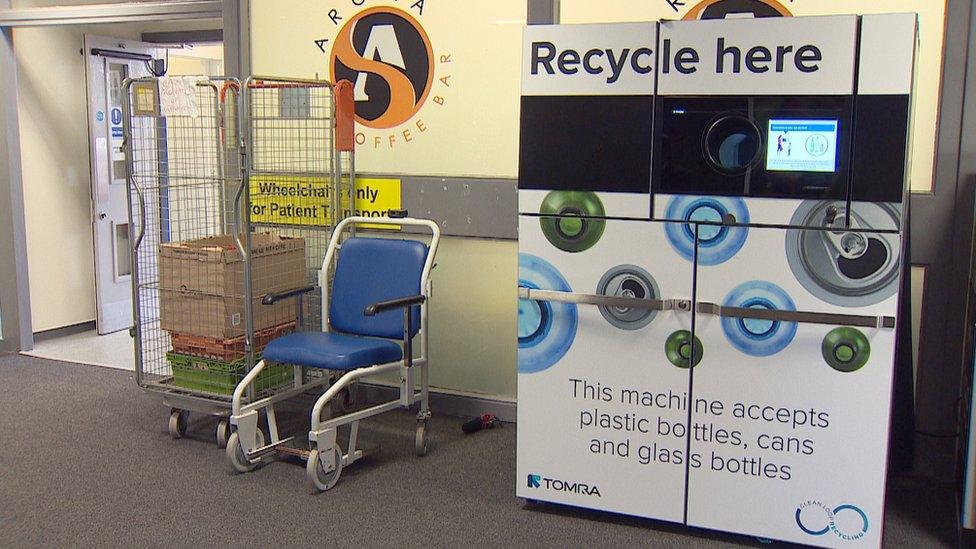
Reverse vending machines like this one at Aberdeen Royal Infirmary are already being trialled across Scotland.
It comes after Circularity Scotland programme director Donald McCalman said it was not informed in advance of First Minister Humza Yousaf's decision to delay it until next year.
He told BBC Scotland he found out at "the same time as everybody else" on Tuesday.
Circularity Scotland, a not-for-profit company set up to administer the scheme, will be responsible for its operation, with Biffa handling logistics.
Mr McCalman told BBC Radio's Good Morning Scotland programme that uncertainties still existed, adding: "Uncertainty causes some businesses to say 'you know what, maybe I need to start thinking differently about how I'm deploying my resources'.
"That's entirely up to those organisations to take that view. We will adapt our plans and make the best use of the extra time that is now available."
Drinks producers will have until 12 January 2024 to register for the DRS.
The scheme is aimed at increasing the number of single-use drinks bottle and cans that are recycled.
It involves customers paying a 20p deposit on drinks in cans and bottles which will be paid back when the containers are returned.
Some retailers will accept returns over the counter, while larger stores, shopping centres and community hubs will operate automated receiving points known as reverse vending machines (RVMs).
But it has faced fierce opposition from many small breweries and distillers.
Many small businesses fear it will place extra costs and other burdens on them at a time when they are already struggling.
And there have been concerns that thousands of firms could end up being forced out of the Scottish market, and that many products will disappear from the shelves.
Related topics
- Published7 June 2023
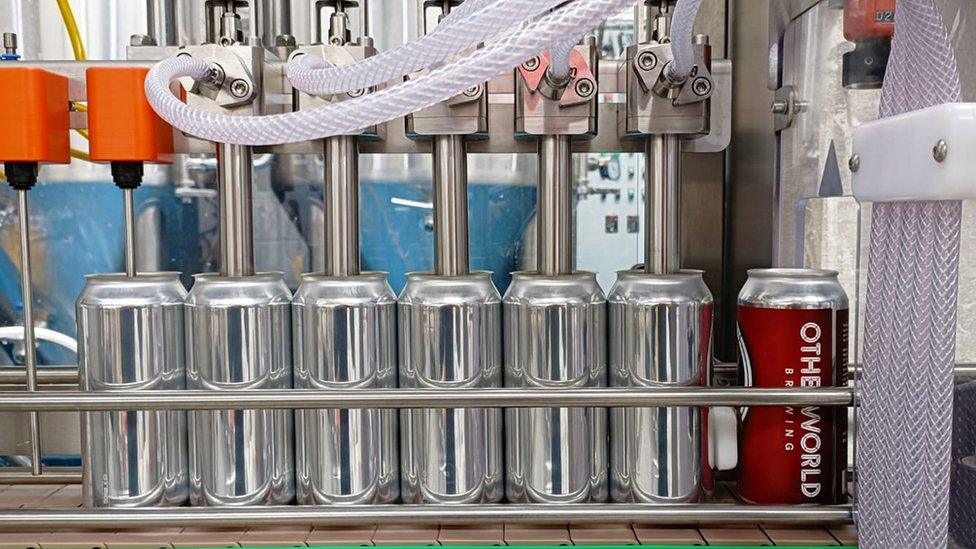
- Published18 April 2023

- Published1 March 2023
